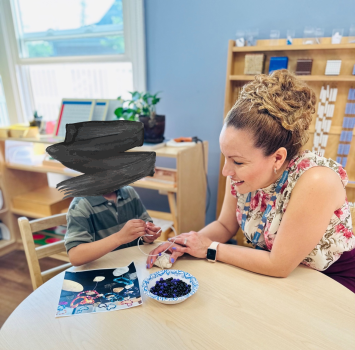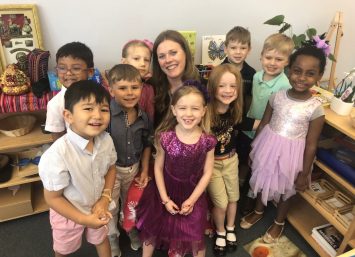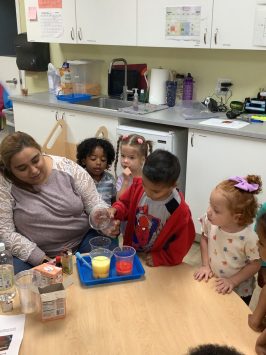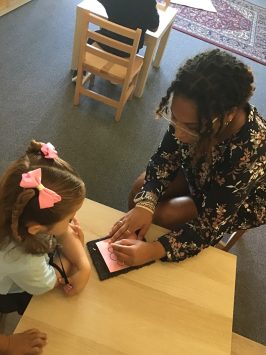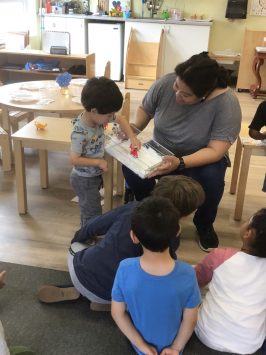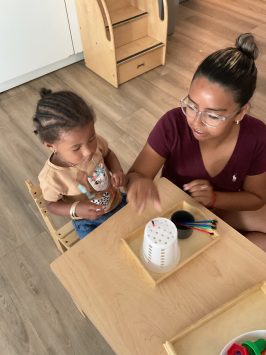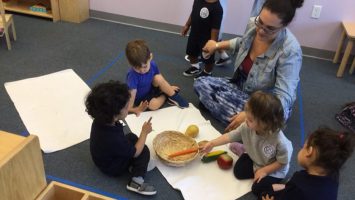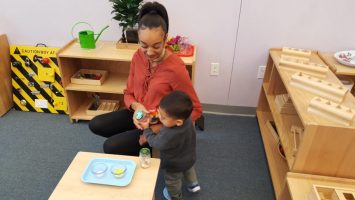FAQ
Q: I’ve visited other Montessori schools. Some are affiliated and some are accredited. What is the difference? And which is THE WOODS?
A: Montessori is a term any individual or school can use in its name. It is not a guarantee of authenticity. The American Montessori Society and the Association Montessori Internationale are the two largest Montessori accrediting bodies, but both also offer “affiliation” status. Affiliation means a school (or individual) pays dues and agrees to adhere to the guiding Montessori principles outlined by each organization, respectfully. However, it is an honor system and while schools may be “affiliated,” the organizational body does not visit or verify an institution’s adherence to Montessori standards. Affiliation does not equal authenticity.
Accreditation, also offered by both entities, is a voluntary undertaking in which schools, in addition to paying association fees, conduct a rigorous self-study program over the course of at least one school year. The process is so intensive that many schools’ self study for multiple school years. An accreditation team visits the school upon completion of the self study period to verify that the school meets the Montessori and educational standards of the accrediting body. Upon successful completion, a school becomes accredited and must renew accreditation every 7 years. THE WOODS has achieved full accreditation with the American Montessori Society and COGNIA (Southern Association of Colleges and Schools) in the Spring of 2020.
Q: Are there any additional fees on top of tuition?
A: Yes, a $250 Materials Fee is assessed on October 1st of every Academic Year and $50 on June 1st for Summer Camp. There is also a one-time $500 enrollment fee. The only other additional fees are lunch costs for those children who participate in the lunch program and the FACTS enrollment fee. FACTS is our tuition payment processing company and they charge an enrollment fee each year per family. The FACTS fee is only charged per family so families with multiple students do not pay additional fees and it is paid directly to FACTS, not THE WOODS.
Snack fees are all included in the price of tuition.
Q: Does THE WOODS serve breakfast?
A: No, THE WOODS does not serve a breakfast meal. We encourage all students to eat prior to arriving to school. There is a breakfast snack provided for children who may still be hungry.
Q: Does THE WOODS serve lunch?
A: Yes, THE WOODS serves a hot lunch catered by Fairfax Food Services. Lunches are USDA and Department of Health approved. We also provide organic milk for all students.
Q: How much does the lunch program cost?
A: Lunch is $5.00 per day. It is added to your tuition invoice at the end of the month.
Q: Does my child have to eat the school lunch?
A: We highly encourage children to participate in the school lunch. Our food program is closely monitored by the Department of Health and lunches from home must meet the standards and regulations set forth by the Department of Health. Additionally, we are unable to heat or refrigerate lunches brought home.
In rare instances (severe allergies, medical conditions, etc.), we may require families to provide lunch from home.
Parents are welcome to send in a supplement on days items are served that children do not like or cannot eat (e.g. vegetarians, taste preference, etc.) Supplements must meet the guidelines for Lunches from Home. Please see the office for more information.
Q: Why does THE WOODS only offer a 5 day/week program?
A: The Montessori philosophy strongly encourages consistency and routine. We find that children thrive and adjust to school better with a set and continuous school week. Additionally, the demand for our current program offerings do not allow for us to offer less than 5 days per week.
Q: Can I choose my child’s teacher?
A: While we welcome parents to indicate a preference for a certain teacher, classroom placement is determined by THE WOODS. Our goal is to create classes that are well balanced in both age and sex.
We are unable to guarantee classroom placements for new children until after August 1 and receipt of the first tuition payment. The Montessori philosophy intends for children to remain with the same class while in a given House level. Therefore, returning children will remain with the same class unless transitioning up to the next level.
Q: Does my child have to wear the school uniform?
A: Yes. Uniforms are affordable and convenient for many families. Additionally, they help place children in a “school frame of mind” and eliminate distractions and envy in the classroom. Uniform help us promote the Montessori goals of independence, concentration, and order. Please see Uniform Guidelines for more information.
Q: Doesn’t a school uniform hinder creativity and individuality?
A: Not at all. Children are encouraged to be creative in their who they are, their work, and self-expression while in school. The uniform places the child in a frame of mind that frees them from distraction and allows them to focus on manifesting their creativity. Additionally, children are welcome to express themselves through their selection of accessories such as shoes, socks, and hair accessories.
Q: Why do students have to wear classroom slippers?
A: Children at THE WOODS wear classroom shoes as this is a traditional Montessori practice. Similar to the uniform, it signals a transition into and out of the classroom. Classroom shoes cut down on foot traffic noise, help keeps classroom floors clean and free from debris (especially important as so much work takes place on the floor), and provide comfort for the child. A recent study out of the UK determined that children actually learn and behave better in classrooms without outdoor shoes.
Q: What kind of slippers can my child wear and where do I get them?
A: Children can wear any slipper that is closed-toed, has a heel, and a rubber sole. Classroom slippers must be solid in color and free from characters and decorations like glitter, pom poms, etc. We recommend Lands’ End or L.L. Bean for appropriate classroom slippers.
Q: Why does THE WOODS have so many days off throughout the year?
A: THE WOODS follows an academic model. Therefore, we have an academic school year and a separate summer program. THE WOODS is closed for most federal holidays and takes a Winter Break, Spring Break, and Summer Break. Additionally, we are closed for a handful of days during the school year for Parent-Teacher Conferences and Teacher Work Days, and Program Set-Up. Please review the school calendar carefully.
Our closures represent our commitment to health and wellness for both our students and teachers. Research shows that school-wide breaks increase productivity and decrease stress for both teachers and students. By providing our faculty with planned vacation time, our breaks are an attractive benefit for our teachers, which helps attract and retain talented educators. Additionally, during school breaks we are able to deep clean our facility at high level that is not possible when students are present which helps promote long-term health and breaks cycles of illness.
Finally, we are committed to the professional growth and development of our teachers as well as strong program planning. Teacher Work Days and Program Set-Up weeks allow our staff the opportunity to maintain the highest of industry standards for training and provide planning, review, and record keeping time to ensure that our faculty is providing your children with an optimal Montessori education.
Q: What do parents do for childcare during school breaks?
A: Most families begin to get in the habit of planning vacations and family visits during school breaks in preparation for elementary school and beyond. Others use drop in daycare at area daycare facilities or take advantage of activity camps at local dance, karate, rec centers, etc. Lastly, many families share care and/or take turns watching each others children during breaks.
Q: Does THE WOODS move children from the Toddler House to Children’s House during the school year?
A: Generally, no. Only in very rare, extenuating circumstances would a child be moved mid-year. Children are placed in their class based on their age prior to September 30. Parents can expect that their children will remain in the class in which they begin the year for the entirety of the school year.
Mixed ages are at the heart of the Montessori philosophy. Even infants and toddlers benefit from their experiences as the oldest children in the class. Additionally, the Montessori classroom is designed to be modified to meet the unique needs of the children in the environment. Therefore, teachers introduce more challenging materials as children demonstrate a need and children are not forced to enter established classrooms mid-year and/or have an unnecessary number of transitions. Teachers often introduce lessons from the next level to help bridge the transition.
Lastly, and perhaps most importantly, transitions to a new house level are much easier and smoother for the child if he or she can begin at the beginning of the year, with other new and rising students, when classroom ground rules are set and routines are established. Tuition costs for the entire school year are also based on the student’s age prior to September 30 and not classroom placement. Therefore, tuition costs are removed as motivators for moving children between levels.
Q: Does THE WOODS offer any enrichment classes or “specials”?
A: Yes. THE WOODS offers both Music class and Spanish class on a weekly basis. Music and Spanish are included in the price of tuition and classes are held after the morning work cycle. These classes are in addition to the informal music and Spanish that are integrated into the Montessori curriculum on a daily basis.
Additionally, THE WOODS offers elective extracurricular activities during the late afternoon (half day children are welcome to return for any elective class). We partner with a number of organizations to offer on-site classes. These are completely voluntary and are not included in tuition. Fees and registration are handled by the respective entity offering the activity and not determined by THE WOODS. Elective classes do not begin until October and information is sent home during the first month of school. In the past we have offered the following elective classes:
- Jump Bunch (sports classes)
- Private Music Lessons
Q: How does THE WOODS integrate Spanish into the Montessori curriculum?
A: In the Toddler House, the Spanish instruction becomes slightly more formal. The Toddler House has a weekly Spanish class that involves basic vocabulary introduction, singing, and stories. At the Children’s House level, each class has at least one 30-minute group lesson with the Spanish Teacher per week. Additionally, the Spanish Teacher spends time in each classroom during the Montessori Work Cycle providing children with individual and small group lessons using Spanish Language Montessori Materials.
Q: Do children have to be at school by a certain time?
A: Yes! A hallmark of the Montessori pedagogy at all levels is the Work Cycle. At the Children’s House the goal is a Three Hour Work Cycle. This allows children to engage fully into their work with minimal interruptions. We encourage students to arrive prior to start of the work cycle (8:15 to 8:30). However, we realize the DC area traffic and the hectic nature of life with children can make this hard so children are welcome arrive up until 9:00 am. If children are not present by 9:00 am, students will need approval from the office to arrive later. Please be aware that children entering the classroom late are very disruptive for the children who are already working and make integrating into class more difficult for the child arriving late. Late arrivals should be an exception, not a habit.
Q: I’ve heard that I need to keep my child enrolled for Kindergarten to get the full benefits of a Montessori education. Is this true?
A: Yes. Dr. Montessori designed her educational method in Three Year Cycles: 0-3 years old, 3-6 year olds, 6-9 year olds, and 9-12 year olds. The third year in any given cycle is a crucial time for the student. This is the year where all the work of the previous two years comes together and many goals that your child has been working towards will be met. For two years, your children will watch older children doing certain work and strive to get to that level. Taking away that opportunity for meeting goals successfully can be significantly defeating to children. Additionally, children gain a unique sense of confidence, leadership, and maturity by being the eldest students in the class.
However, we believe some Montessori education is better than no Montessori education at all and that your child will benefit significantly from time spent in a Montessori environment. While we strongly encourage children to stay for Kindergarten (or finish their 3 year old year in the Toddler class or elementary students to stay for 3rd Grade as the case may be), we still welcome children to enroll even if Kindergarten does not seem possible for you. However, we do have to give priority to families that are committed to completing the Three Year Cycle.

